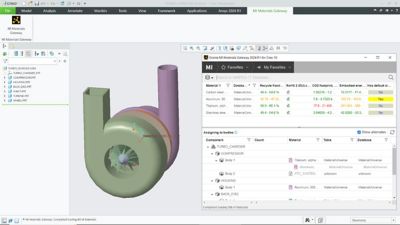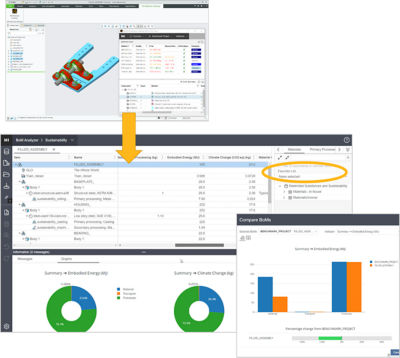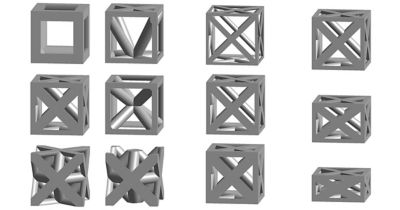-
United States -
United Kingdom -
India -
France -
Deutschland -
Italia -
日本 -
대한민국 -
中国 -
台灣
-
-
產品系列
查看所有產品Ansys致力於為當今的學生打下成功的基礎,通過向學生提供免費的模擬工程軟體。
-

Materials are essential for innovation, competitive advantage, and business transformation. The data associated with materials is among the most valuable information that a business can possess. However, this critical data frequently is managed using outdated solutions and stored in silos across departments at a business. Furthermore, high-quality materials information that is readily available and easily accessible in engineering design systems, such as computer-aided design (CAD), product life cycle management (PLM), and computer-aided engineering (CAE), is crucial for making better decisions. Selecting the best material for a product or an application can have massive implications in terms of cost, performance, and sustainability objectives.
The Ansys Materials product collection, including the Ansys Granta MI materials intelligence platform, Ansys Granta Selector materials selection software, and the Ansys Granta Materials Data for Simulation (MDS) properties database, offers a holistic approach to managing materials data and information, providing selection tools for making the most appropriate trade-offs when choosing a material, giving access to high-quality materials information from leading industry providers, and making them easily accessible in engineering tools.
In Ansys 2024 R2, Materials products better enable accurate, reliable multiphysics simulations, provide more efficient tools for evaluating sustainability metrics early in the design process, and deliver higher performance and productivity to users.
Enhance Multiphysics Simulation With Materials Intelligence
Accurate materials data is crucial for precise design and simulation. However, locating reliable data can be time-consuming and challenging. Data sourced from uncertain outlets needs to be converted into models compatible with your simulation software, introducing the risk of errors.
The Granta MI platform’s latest release features enriched material for the main JAHM library, where more than 4,700 records have been added for thermoelectric materials, glasses, alloys, and more, including nonlinear data for some records. For advanced data add-ons, the high-temperature alloys library has had key supporting information added for test standards, the number of specimens, curve information, and interpolation. The polymers library features new data from producers like Kuraray Co., Ltd. and MOCOM Compounds GmbH & Co. KG, including new nonlinear data, and the electromagnetics library offers improved fits for core loss curves. All updates give more power to users to select and use accurate materials information for design, simulation, and decision making.
Design and simulation engineers should have seamless access to materials information and properties in their simulation tools. Integrating a single, centrally managed, traceable, and approved source of materials data into the entire product design and development process can ensure consistency and control across enterprises.
The material calibration application, available in Ansys Granta MI Enterprise materials data management software, allows users to generate material models for Ansys Mechanical structural FEA analysis software from experimental data. It now includes plasticity models, enhancing the accuracy of such simulations.
The MI Gateway feature, which provides seamless access to materials data and information in CAD, PLM, and simulation tools, enables users to subscribe to their favorite materials list, improving productivity alongside the performance increase in the previous version.

Improvements like subscribing to a favorites list can boost productivity and enable accurate multiphysics simulations.
Sustainable Design With Material Insights
Materials play a crucial role in a company's journey toward achieving zero net carbon emissions. Teams developing products must carefully consider materials that can meet performance and cost requirements, comply with environmental regulations, and align with changing customer preferences. However, many engineers are not aware of the sustainability impact of their material choices. It is important to consider these factors at the beginning rather than the end of the design process to avoid costly redesigns and delays in product launches.
The Granta MI platform’s sustainability add-on provides specialized design teams with reference data, analysis tools, and a management framework to help them make proactive, data-driven decisions regarding materials. With access to a wide range of material properties, they can conduct detailed product analyses, identify alternatives, and create preferred materials lists that include sustainability indicators.
Following its release in the previous version, the sustainability add-on for the Granta MI platform brings significant improvements in functionality for the bill of materials (BOM) analyzer that help improve productivity and gather insights more easily.
Users now can perform BOM analysis and comparisons directly in the BOM analyzer, enabling them to quickly compare the environmental impact of different designs. Furthermore, the analyzer can be configured to automatically run when loading a BOM from the Granta MI platform’s material gateways, providing a seamless transition between CAD/PLM tools and the platform, improving engineering productivity and making it easier than ever to understand the environmental impact of the product. The analyzer’s assignment trees can be filtered by the favorites list, enabling designers and CAE engineers to easily pick materials directly from published preferred materials lists. Finally, new sustainability data has been introduced into the MaterialUniverse materials library, and over 4,000 records have been added to the advanced materials eco library, which covers industry sectors.

The bill of materials (BOM) analyzer tool now can perform analysis and comparisons directly in the Ansys Granta MI materials intelligence platform.
Boost Productivity and Performance
A materials information management application offers enterprise-level solutions and serves stakeholders at an organization. It should not only provide useful functionalities that make life easier for all stakeholders, but should do so in a user-friendly manner. Great performance, excellent user experience and usability, high availability, and resilience to failure are key aspects of such a system.
In this latest release, the Granta MI platform offers higher performance, a superior user experience, and optimized resource usage to keep your system running smoothly.
The user experience has been enhanced in the One MI Explore tool to support sharing custom searches, saving time and effort when searching in a specialized way. New examples for the Python scripting toolkit are now available, guiding users through how to structure reporting and analyze data revisions, boosting productivity and saving time from digging through documentation.
To reduce downtime and critical failures, it is now possible to simultaneously run two identical Granta MI platform stacks behind the load balancer. If one of the stacks fails, the other one takes over automatically, recovering from the failure and ensuring limited downtime. Furthermore, with this release a framework to monitor and observe the server is available that offers better diagnostics and early warning, monitoring health metrics to reduce the risk of failure.

Improvements have been made to minimize downtime and critical failures.
Discover the Granta MI Platform
The Granta MI platform offers a range of materials information management software designed for companies to realize their in-house material intelligence. The platform provides a scalable solution to create, control, and store your company's valuable material data, offering seamless integration with leading CAD, CAE, and PLM systems for enterprise-wide consistency. Choose the optimal material for your application with Granta Selector software. Trade off materials properties from a comprehensive database to help you select the best-suited material for the application. Boost your simulation accuracy with access to our materials data library.
To learn how a materials management solution can benefit your team, request a free assessment.
The Advantage Blog
The Ansys Advantage blog, featuring contributions from Ansys and other technology experts, keeps you updated on how Ansys simulation is powering innovation that drives human advancement.













